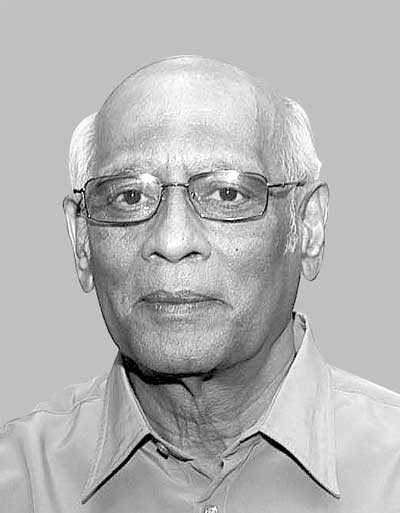THE JEWEL
Ratna Sivaratnam
Aitken Spence
No praise is greater than words from a peer who holds you in high esteem. Mourning the death of one of his dearest friends, Deshamanya Ken Balendra wrote: “Roti was humble, charming and generous, and a great friend to many. He was honest to a fault – and was respected for this. His commitment, efficiency and leadership qualities were unquestionable. His support for his friends was hard to match.”
Balendra’s and Ratna (‘Roti’) Sivaratnam’s friendship baffled corporate colleagues. They were both ‘competitors with no quarter asked and none given,’ according to many. One headed John Keells Holding (JKH) and Sivaratnam the other of the country’s two largest tourism companies at the time; “but that was Roti. Compete, yes but not at the cost of a long and close friendship.”
Sivaratnam joined Aitken Spence – after completing his secondary education in 1960 – as a trainee executive in the insurance department. He has said: “I had no ambition of reaching the top but seized the opportunities that came my way and worked hard to achieve the dreams of the company.”
Insurance and plantations were nationalised in the early 1970s and the company had to look at new options for diversification. An investment of Rs. 20 million was made, urged by Sivaratnam, to build the company’s first hotel – Neptune, in Beruwela, in 1974. The property comprised 80 rooms and no one to occupy them.
The next phase was developing an inbound tourism business. Sivaratnam was promoted to general manager and later a director of the company’s hotel management subsidiary – Aitken Spence Hotel Managements. He was appointed to the board of the parent company in 1978.
In 1995, Sivaratnam was appointed Chairman and Managing Director of Aitken Spence. He had spent his entire working life at Aitken Spence; and even after retirement, he continued to be associated with the company as a non-executive director until his demise.
Balendra shares this anecdote of the unusual moniker: “I once asked him how he came to be nicknamed ‘Roti.’ He said that his class master… asked the students to announce what each had for breakfast… This was in the late ’40s, and most of the students said ‘bacon and eggs’ or mentioned other typical Western breakfast items. When it was Ratna’s turn to answer, he unhesitatingly said ‘roti’ – and the nickname Roti stuck to him ever after.”
Ratna Sivaratnam (as he described himself): “a conformist who deviated here and there to do what I loved most.”





